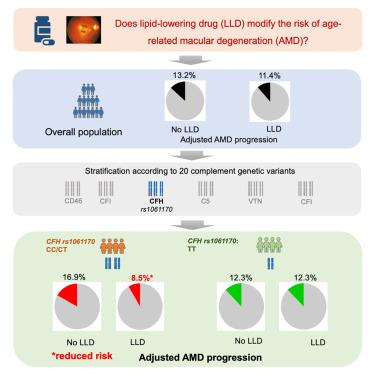Lipid-lowering drug and complement factor H genotyping–personalized treatment strategy for age-related macular degeneration
IF 4.6
2区 综合性期刊
Q1 MULTIDISCIPLINARY SCIENCES
引用次数: 0
Abstract
We investigated whether the effect of lipid-lowering drugs (LLDs) on age-related macular degeneration (AMD) differs according to the main complement genetic variants in Singapore Epidemiology of Eye Diseases (SEED) (n = 5,579) and UK Biobank studies (n = 445,727). The effect of LLD was determined for each stratum of 20 complement genetic variants. In SEED, 484 individuals developed AMD and 216 showed progression over 6 years. In the UK Biobank, 913 participants developed AMD over 11 years. rs1061170 variant (complement factor H gene) was the only variant for which we found a protective effect in both populations. This effect was found in individuals carrying at least one C allele in SEED (odds ratio [OR] = 0.41; 95% confidence interval [CI], 0.19–0.87) and in individuals carrying two C alleles in UK Biobank (hazard ratio [HR] = 0.65; 95% CI, 0.45–0.93). These effects corresponded to a 50% and 35% decrease in AMD risk, respectively. Our study highlights the potential for personalized therapy for AMD based on complement genotyping.

降脂药物和补体因子 H 基因分型--老年性黄斑变性的个性化治疗策略
我们调查了新加坡眼病流行病学研究(SEED)(5,579 人)和英国生物数据库研究(445,727 人)中的主要补体遗传变异对降脂药物(LLD)对老年性黄斑变性(AMD)的影响是否存在差异。针对每个层的 20 个补体遗传变异,确定了低密度脂蛋白血症的影响。在 SEED 研究中,484 人患上了 AMD,其中 216 人的病情在 6 年内有所发展。rs1061170变体(补体因子H基因)是我们在这两个人群中发现的唯一具有保护作用的变体。在 SEED(几率比 [OR] = 0.41;95% 置信区间 [CI],0.19-0.87)和 UK Biobank(危险比 [HR] = 0.65;95% 置信区间 [CI],0.45-0.93)中,至少携带一个 C 等位基因的个体具有这种效应。这些效应分别相当于降低了50%和35%的AMD风险。我们的研究凸显了基于补体基因分型的个性化黄斑变性治疗的潜力。
本文章由计算机程序翻译,如有差异,请以英文原文为准。
求助全文
约1分钟内获得全文
求助全文
来源期刊

iScience
Multidisciplinary-Multidisciplinary
CiteScore
7.20
自引率
1.70%
发文量
1972
审稿时长
6 weeks
期刊介绍:
Science has many big remaining questions. To address them, we will need to work collaboratively and across disciplines. The goal of iScience is to help fuel that type of interdisciplinary thinking. iScience is a new open-access journal from Cell Press that provides a platform for original research in the life, physical, and earth sciences. The primary criterion for publication in iScience is a significant contribution to a relevant field combined with robust results and underlying methodology. The advances appearing in iScience include both fundamental and applied investigations across this interdisciplinary range of topic areas. To support transparency in scientific investigation, we are happy to consider replication studies and papers that describe negative results.
We know you want your work to be published quickly and to be widely visible within your community and beyond. With the strong international reputation of Cell Press behind it, publication in iScience will help your work garner the attention and recognition it merits. Like all Cell Press journals, iScience prioritizes rapid publication. Our editorial team pays special attention to high-quality author service and to efficient, clear-cut decisions based on the information available within the manuscript. iScience taps into the expertise across Cell Press journals and selected partners to inform our editorial decisions and help publish your science in a timely and seamless way.
 求助内容:
求助内容: 应助结果提醒方式:
应助结果提醒方式:


